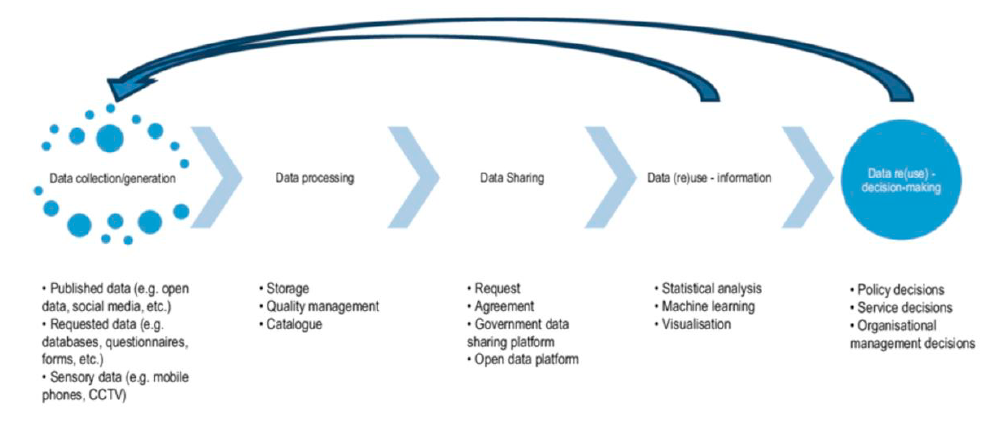About the Data-Driven Services of the Centre
About the Data-Driven Services of the Centre
Data-Driven Services (DDS) refer to the use of data for evidence-based management. DDS focus on data as a critical resource for value creation and develop their full relevance in cases where large amounts of data need to be collected, processed and visualized or disseminated to inform decision-making. DDS are used to answer the question what should be done next, based on the diagnosis of past and current events (diagnostic analytics), and by building hypothesis about future events (predictive analytics).
- In diagnostic analysis, data from past and current events is used to assess an existing situation, by identifying and comparing trends, uncovering correlations between variables and determining causal relationships. The data might be visualized with the help of charts, graphs, and maps to illustrate trends and relationships.
- In predictive analytics, the information derived from diagnostic analytics is used to build hypothesis about future events, and to determine actions that lead with heightened probability to desired outcomes.
The DDS offered by the Centre are geared towards other institutions offering capacity development services including face-to-face training and online learning activities. An example for a DDS geared towards such a capacity development service provider is the IT supported analysis of big data from past and ongoing online learning activities for evidence-based decision making about the design of future learning cycles.
The DDS of the Centre are organized along the steps of a generic data management process and support the institutional partners to collect, process, share and use data for information and decision-making purposes.
Steps of the data management process

Source: OECD 2018
More specifically, the DDS of the Centre might be used to:
- Identify data sources and assess their suitability
- Acquire data
- Ingest and profile data
- Manage meta data
- Clean data
- Process large quantities of qualitative data
- Model data
- Transform and consolidate data
- Visualize and present data
- Disseminate data
- Interpret data for decision-making purposes.
The DDS of the Centre are grouped along three themes:
- DDS to increase the outreach of capacity development services
- DDS to improve the impact of capacity development services
- DDS to manage knowledge along the capacity development service cycle.
DDS to increase outreach of capacity development services support institutions to better target their intended beneficiaries with the help of digital technology. For example, social media and Customer Relationship Management applications can very effectively leverage outreach campaigns and promote services at low cost. Also, with the help of algorithms, big amounts of data can be analysed to better segment beneficiary groups and to tailor messages to their distinct characteristics.
DDS to improve impact of capacity development services support institutions to fine-tune service content and -delivery methods with the help of digital technology. Examples for DDS to improve service impact are micro-level learner dashboards that allow learning activity managers to monitor learner progress in distance learning activities in real time; digital certification schemes that greatly facilitate the portability of learner credentials; and meta-data analysis software packages to strengthen qualitative evaluations of learner impact.
DDS to manage knowledge strengthen the capacity of institutions to better inform decisions along the steps of the service delivery cycle by creating systems for data collection, processing, analysis, visualization and dissemination with the help of digital technology. For example, at the design stage, actor network mapping applications help to visualize complex stakeholder landscapes; at the implementation stage, chatbots powered by Artificial Intelligence can be used to offer access 24/7 access to information; and at the check stage, digital monitoring and evaluation systems can greatly facilitate wide dissemination of results.
The DDS of the Centre conform with UN global standards for digital transformation including digital human rights (https://www.un.org/techenvoy/content/digital-human-rights). They comply with global best practice in data privacy and –security (the Centre is ISO 27001 certified: https://www.iso.org/isoiec-27001-information-security.html ) and they are firmly rooted in the Centre’s digital inclusion and digital accessibility principles described in its 2020-21 Programme and Budget. Refer to the fact sheets for selected use case of the Centre’s DDS.